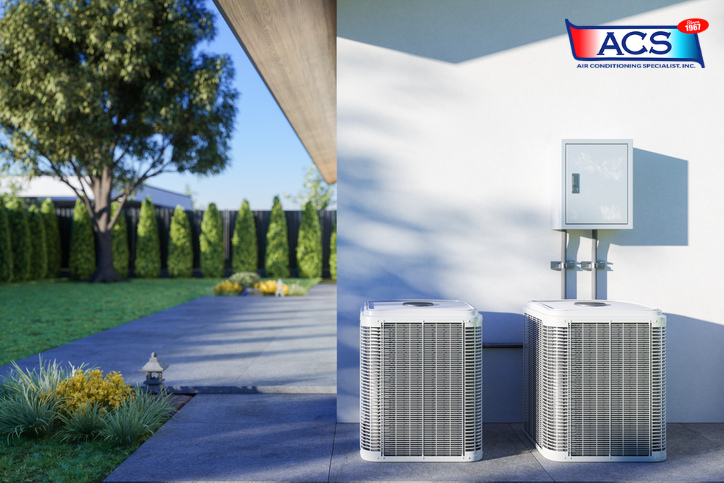Nothing is worse than air conditioning that doesn’t work properly—especially during a southern summer. Even if your unit operates as it should, it’s a good idea to check up on it to ensure everything is in order. At ACS, we’re your local experts in finding AC solutions, and we’ve seen it all. If you’re dealing with any of the following common problems, give us a call, and we can help. Read more to learn about issues to look for when performing maintenance checks.
Leaks
Internal AC leaks are often due to a clogged condensate drain line, which means water isn’t draining properly and is backed up, causing leaks to get into your home. Regular maintenance of your system will help prevent clogged drain. A leak may also be caused by a disconnected drain line and ill-fitting pipes. If you’re unsure of the root of the leak or how to address it, call in the professionals to use their special equipment to fix your leak.
Dirty Filter
With a dirty, clogged filter, you may notice warm air coming out of your unit instead of the expected cool breeze. A clogged filter causes air to build up and lower the internal temperature, trapping cold air and causing potential freezing. A dirty filter means your air conditioner has to work harder to cool down the house, contributing to a shorter lifespan and increased repairs. It’s recommended that you change your filter every 30 days to avoid
Freezing
If your AC is frozen, there might be an obvious sign, such as ice on your refrigerant line-set pipe. Check between your outdoor AC unit and your home’s exterior. Other possibilities include a frozen evaporator coil or more subtle signs like a lack of cool air or condensation around your indoor unit or condensate drain. If the unit is ever frozen, be sure to cut it off to thaw so that a technician can properly work on it when they arrive.
Strange Smells or Sounds
A foul smell or unusual noise coming from your AC unit could indicate a larger program, often from the compressor, driveshaft/fan blower, or the fan blade. A musty smell may be from accumulating water in the drain pan or drip lines. Dirty filters are also a common culprit. A strange noise is most likely from a broken motor, whether it’s in the compressor or the blower fan motor.
AC Not Turning On
Any of these issues listed may result in your air conditioning simply not turning on altogether. When the outdoor unit doesn’t turn on, it’s often related to a tripped circuit breaker and can be fixed by resetting the circuit breaker panel. If that doesn’t appear to be the issue, check the thermostat and make sure it’s working properly. Other causes may not be so easy to diagnose or fix, but a professional like ACS can determine if there’s a deeper issue and find a solution.
Circuit Breaker Keeps Tripping
If your circuit breaker keeps tripping, it is likely due to circuit overload. It may also be caused by a loose connection, a failed capacitor, or a short in the wiring. To prevent this, try running fewer applications at once on the same circuit or have an electrician add additional circuits to your home. We don’t recommend simply resetting the circuit breaker—it’s meant to protect from currents, so if it keeps turning off, there’s likely a bigger issue that needs to be addressed.
Capacitor Failure
A sign of a bad capacitor is if your air conditioner’s compressor is repeatedly stopping and starting or making noises such as humming and clicking. A degrading capacitor will bulge in appearance with its top growing into a domed shape. You may also notice issues with the AC unit turning on and off, warm air instead of cold, or a humming noise.
Malfunctioning Thermostat
If your HVAC systems don’t turn on at all, it may be signaling a broken thermostat. The same goes if you can’t change your settings from heating to cooling or if the thermostat is otherwise not correctly operating. If changing the batteries isn’t helping with a faulty thermostat, check to see if your drip pan is full. In some cases, a full drip pan will shut off your thermostat. If you can’t identify the culprit, it’s likely time for professional help.
Fan Failure
You’ll notice a broken fan if it doesn’t move even when the AC is on, or it won’t stop even when you shut the AC off. Most of the time, an evaporator (indoor) fan-motor failure causes the indoor coil and suction line to freeze over. A condenser (outdoor) fan-motor failure causes the compressor to get extremely hot, break down the internal lubricant, and contaminate the system.
Worn-Out Contactor
A bad contactor may cause insufficient cooling, electrical failure, cracked evaporator coils and condenser, high electricity bills, strange noises, and frequent repairs or replacement. A worn-out contactor won’t pull close, forfeiting the connection between the two sides and rendering the AC inoperable. Symptoms of a bad AC contactor include a condenser unit that won’t shut off or a humming/chattering noise.
FAQ
How do I stop my air conditioner from leaking?
Before calling in the pros, if you feel confident, try changing your air filters, cleaning the condensate drain line, making sure your drain pan is correct, pouring bleach into your drain line, and avoiding overworking your air conditioner in the heat.
How do I get rid of the smell in my air conditioner?
Although a smell may indicate a bigger issue to fix, try turning off the power, changing the air filters, cleaning the evaporator coils, and cleaning the condensate line to get rid of the smell itself.
How do I reset my central air conditioning unit?
Your first step is turning off your air conditioning system using the thermostat. Then, you’ll want to shut off your AC unit at the breaker. Turn it back on after a full minute. After 30 minutes, turn the AC back on at the thermostat as well.
How many times can a breaker trip before it needs to be replaced?
A circuit breaker should not trip more than four or five times before needing replacement.
How do you tell if a capacitor needs to be replaced?
A bad capacitor may be detected from smoke or a burning smell, a humming noise, a faulty unit that takes too long to cool, a lack of cold air altogether, a unit that shuts off randomly or doesn’t turn on at all, or higher energy bills.
What are the symptoms of a bad AC thermostat?
If your AC unit isn’t responding to temperature changes, if it runs constantly or won’t turn on, if there is no LED display, or if the thermostat is old, it may be time to fix your thermostat.
No matter the problem with your AC unit, ACS can help. We recommend contacting us for our services as soon as your AC stops working or if you want to take preventative measures. Don’t worry—we’ll help you keep your cool.


